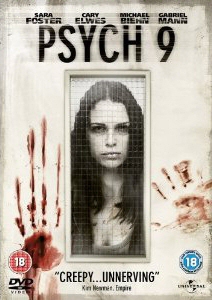
A woman flees an attacker in a film noir-style sequence before the opening credits for Psych: 9 begin to roll…credits in which richly-coloured Rorschach inkblot diagrams start to reveal more and more menacing images. From the outset then, you know you're going to be dealing with some aspect of psychiatry, and it's going to be stylishly done. This Psych: 9 certainly does deliver. This is a film with high production values and plenty of atmosphere - although, for all that atmosphere, its take on the theme of mental illness is at times a ponderous one.
The film proper starts with a young woman, Rosalyn (Sara Foster) applying for a graveyard shift admin job at a soon-to-close hospital, St. John's. She'll be working largely alone, handling and filing psychiatric reports and death certificates; it's hardly a laugh a minute, and to begin with Rosalyn herself hardly seems full of the joys of spring. There's evidently something behind her decision to take such an isolating job - but what?
Soon after starting work in the now empty hospital, Rosalyn is visited by a Detective Marling (Michael Biehn) who alludes to the murder we saw in the opening scene: there's a serial killer on the loose in the city. As if working in a deserted, spooky hospital wasn't bad enough, Rosalyn is now very frightened of the so-called Nighthawk killer. Even someone as self-contained as this woman seems to be is bound to be affected by the barrage of strange noises, half-glimpsed figures and unwholesome atmosphere of this place. Be these supernatural or very much human in origin, Rosalyn finds the job is getting to her.
With her concerns as an impetus, Rosalyn starts to open up the only other member of staff in the building, the psychiatrist Dr. Clement (Gary Elwes) who works upstairs. He's a voice of reason: everyone else in her life seems so strange. Her husband, Cole (Gabriel Mann) is by turns blasé and aggressive - and there's some problem regarding trying for a baby which isn't helping their marriage any. All of this pressure is making Rosalyn go to pieces and before long, Dr. Clement is more her shrink than her colleague. She obviously needs one - there are, it seems, a lot of spectres haunting her which go far beyond the rigours of her job.
Visually this film is spot-on: whoever dressed the sets did a splendid job and all the shots are framed with real artistic flair. The film makes good use of light and shadow, and seems to use two different colour palettes for the scenes in the hospital and the scenes in the marital home, the former being blue/cold/starkly lit and the latter all rich reds and warm lighting. Add to this the slow, orchestral incidental music which accompanies almost every scene and you have a recipe for stylish foreboding. One of the things Psych: 9 seems to be doing is exploring the idea of the Uncanny - things or places which are strange but seem somehow familiar. Rosalyn says that she was born at the hospital - but other things seem familiar to her, like pieces of medical equipment. This sense of strangeness is carried very well by the atmospheric feel of the film.
That said there are some issues here which, for me, prevented a good film being a great one. This is perhaps an exercise in atmosphere rather than a clear-cut story, because the plot here is minimal, and what does happen is drawn out and developed for purposes of mood. For example, a person walking along a corridor becomes a slow, deliberate, scrutinised exercise. It looks great, but doesn't tell us that much. I also feel that Sara Foster as Rosalyn struggles a little to convey everything that she needs to in this role. Although Rosalyn starts out very introverted, as the film progresses we find out that there is a great deal of turmoil going on beneath that tranquil surface, but Foster doesn't quite communicate that, reverting to blankly pouting on occasion. Of course, any issues with her performance are amplified by the amount of screen time she gets - most of the film's scenes are hers.
Psych: 9 certainly weaves something interesting and nightmarish out of its theme of mental illness, it's just that it's done in a slow manner which may not satisfy everyone. It seems to owe something to Shutter Island - although that film drives a lot harder at its conclusion - but in terms of a sinister hospital where clues to what's really going on actually figure in the main character's story, the two films are similar, though not everyone will appreciate this film's ultimate observations about the legacy of abuse (thought they may well guess the plot twist).
This release contains an Indi Vision promo reel, followed by three trailers which appear before the main menu. These are: Spiral, Scar 3D and The Broken. In terms of extras, we have some outtakes, deleted scenes, a trailer for the main feature and a 35-minute 'month in the life' feature on the director, Andrew Shortell, with the sort of behind the scenes footage you might expect. The transfer here is great, with rich colours, deep blacks, and good clarity, and the sound levels - with a special mention to the great musical score - are clear throughout.
Review by Keri O'Shea
| Released by Universal Pictures UK |
| Region 2 - PAL |
| Rated 18 |
| Extras : |
| see main review |